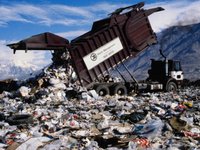Expanded Recycling - a Key to Cutting Fossil Fuels and Global Warming
 What is "expanded recycling?"
What is "expanded recycling?"
To governmental agencies and utilities "expanded recycling" means changing regulations so we can move more trash from the black bin into the blue bin... or making more pre-sorted pickups available from multi-family dwellings (apartment buildings and condos). Some (Californian's Against Wastes and other environmental groups) see it as reducing the source of waste - reducing packaging while manufacturing products out of more biodegradable and recyclable materials. To them it also means holding manufacturers accountable for recovering their spent products and reusing their components. Certainly "expanded recycling" is all of these.
But to a growing legion of waste management professionals expanded recycling can also be achieved through biomass conversion technologies (CTs). According to their preferred waste management hierarchy, after the source of waste has been reduced and reused, and as much of the trash has been recycled and composted as possible, the bulk of the residual should be recycled molecularly using clean conversion technologies.
How big is this mountain of residuals? In spite of our best efforts at recycling, it is as big as it was when recycling started back decades ago - roughly 40 million tons per year in California. Why?... because of population growth and expanded consumption of packaged goods. Since most of these goods are imports, reducing or redesigning the source of waste is an unreal expectation without draconian change in consumer behavior and trade regulations.
Isn't halting growth good enough? No - because the only "ultimate" solution now is landfills and they are filling up fast. Los Angeles Co. Department of Sanitations' gargantuan landfill in Puente Hills (13,200 tons per day or approximately 65% of their responsibility) will run out of room within seven years. Their backup site is 200 miles away. That means using a new expensive "waste-by-rail" train system to ship the residuals to the desert. That will require the equivalent of a 3-mile long train each day!
So time is running out. Currently under evaluation for deployment of a new CT facility by the Los Angeles Department of Public Works are a number of suppliers - one supplier using anaerobic digestion, two using waste-to-fuel technology, and six using thermal technology. Using various clean biological and thermal processes they seek to recycle as much as 85% of the residual waste volume by converting it into its molecular components and reforming them into synthesis gas, sugars and oils, low sulfer diesel, and "green" chemicals.
The synthesis gas (primarily CO and H2) could be combusted - but a cleaner more cost-effective alternative would be to ferment it into ethanol or reap the hydrogen - the cleaner air renewable fuel alternatives for ending gasoline dependence. The thermal technologies would also provide a clean alternative source of steam for co-generating electricity.
What relevance is "expanded recycling" to global warming and California's AB32? Landfills reek methane (21 times more toxic than C02 as a greenhouse gas) and although modern landfills capture much of this gas, they have been identified as one of the principal targets of the carbon cap legislation. Other major targets are electrical power plants, oil refineries, and utilities. By using conversion technologies, positive emissions impacts can be made on all of these - fewer fossil fuel burning power plants; less dependence on high-polluting oil and oil refining process; more reliance on cleaner fuel vehicles and hybrids; fewer landfills and cleaner wastewater and solid waste disposal. A side benefit - the use of noisy, polluting trucks and trains to haul trash from sorting centers to landfills will be cut by an estimated 60%.
The utilities - mostly LA/Department of Public Works and LA/Department of Sanitation - need public understanding and support for their efforts to permit and deploy conversion technologies. These people are heroes in my book because in an age of increasing media exploited cynicism they are in the background valiantly solving problems. Warrantless legal battles with local communities and idealists puts a counter-productive strain on problem-solving. These problems are real and their social costs are mounting.
The status quo is the real enemy. We, the public and its media, need to support "our soldiers" on the front line - the utilities.
technorati emissions, California, legislation, waste, bioenergy, environment, investment, conversion, CTs, greenhouse, ghg



1 comment:
Learn about how they recycle stuff in Sweden!
Recycling in Sweden->
Post a Comment